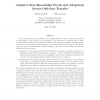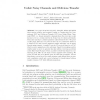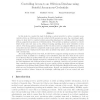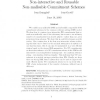19 search results - page 3 / 4 » Anonymous Fingerprinting Based on Committed Oblivious Transf... |
TCC
2009
Springer
14 years 6 months ago
2009
Springer
In the setting of secure computation, a set of parties wish to securely compute some function of their inputs, in the presence of an adversary. The adversary in question may be st...
TCC
2004
Springer
13 years 10 months ago
2004
Springer
In a paper from EuroCrypt’99, Damg˚ard, Kilian and Salvail show various positive and negative results on constructing Bit Commitment (BC) and Oblivious Transfer (OT) from Unfair...
PKC
2009
Springer
14 years 6 months ago
2009
Springer
In this work, we consider the task of allowing a content provider to enforce complex access control policies on oblivious protocols conducted with anonymous users. As our primary ...
STOC
2003
ACM
14 years 5 months ago
2003
ACM
We consider non-malleable (NM) and universally composable (UC) commitment schemes in the common reference string (CRS) model. We show how to construct non-interactive NM commitmen...
EUROCRYPT
2007
Springer
13 years 9 months ago
2007
Springer
We show an efficient secure two-party protocol, based on Yao's construction, which provides security against malicious adversaries. Yao's original protocol is only secur...




